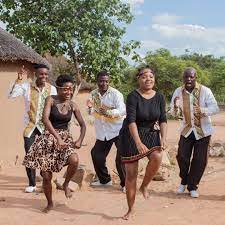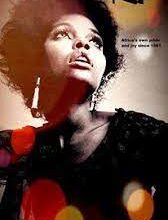Black Umfolosi – The United Imbube Group that Unites the Nation

Black Umfolosi

By Tapfuma Machakaire 17/1/2023
Greed, intolerance and poor managerial skills have shuttered prospects for the development of many performing groups in the music industry. A quick perusal at the history of most groups in Zimbabwe will reveal a common pattern of artistes deserting either to start their own new projects or just as a result of irreconcilable differences with colleagues.
This is not the case with the famous Bulawayo-based a cappella ensemble Black Umfolosi which has remained intact for over four decades. Moreover, it would have been ironic if the group that composed the hit song Unity, in 1987 was to disintegrate for failing to remain united.
There are several version on how the group was formed but what is not in dispute is that it was started by youngsters at school. The origins of the name are said to be either from the 19th-century Zulu revolutionaries the Dark Umfolosi Regiment or was adopted from the Umfolosi Omnyama River in Natal province, South Africa.
In August 2021 reporter Mthabisi Tshuma of The Chronicle spoke to group co-leader, Thomecki Dube who gave a first-hand account of the history of the group. He said his musical journey started in March 1982 when he was a Grade 7 pupil at George Silundika Primary School in Ntabazinduna now Ntabazinduna Police Training Camp.
This was after the school had received a donation of a piano and a box guitar from the Zimbabwe Foundation for Education with Production (Zimfep). “There was so much excitement among students. We quickly formed a school band and named it Super Codes.” “Although I wasn’t part of the group by then, we discussed an alternative as students. A guy called Cain Mzwanyana, nicknamed Jupitor Johns from Ngwana in Plumtree suggested that we instead form an imbube choir.”
He said the group then started conducting rehearsals after school and during weekends.
“Jupiter was the lead singer and took the school by storm as we outclassed the Super Codes.” He said the second week after forming the arts group, they held their first concert at Madlelenyoni Secondary School in Umguza District.
In 1983, the school merged with JZ Moyo Primary and Secondary School in Nyamandlovu at an institution that was named in honour of national hero George Silundika. “While in Nyamandlovu, our first concert was at Magama Mission followed by concerts at Tsholotsho High, Fatima Mission, St. James, Mtshabezi Mission, Ingwenya Mission and Thekwane High School. These are the schools that made us who we are today,” said Dube.
Later that year, the group moved to Bulawayo where they started holding shows in the high density suburbs. “We staged several shows at both Luveve and Mpopoma halls resulting in the Zimbabwe Arts Council enlisting our services at state events,” said Dube.
He said in 1984 the group recorded its first single titled Izono Zethu (our sins) at Grammar Records in Harare.
In an interview with a local newspaper, the Sunday Life, Sotsha Moyo, the other group co-leader said the secret of his group remaining united was that they got into the arts not for monetary benefits but for the love and passion for music.
“We have managed to work together as a group for a very long time now because we didn’t form the group on the basis of looking for money and fame like many of the groups that we see today. “When we realised that we could make a living out of music, we put up a guiding policy document which we follow,” he said.
Moyo said those who left the group to pursue different dreams did so on a happy note.
The group leaders shared the background to the song Unity with a Herald reporter in December 2021. They said the song was composed on the eve of the signing of the Unity Accord on December 22, 1987.
Dube said the song, which became the soundtrack of the Unity Day celebrations, was the group’s own initiative to match the relevance of the signing of the historic agreement.
The initiative arose after the group had been invited to the Harare International Conference Centre (HICC) to sing its track titled, 1980 Happy Birthday to you Zimbabwe at the signing ceremony.
But instead, the night before the event they worked on a song Unity. “We don’t know how we wrote that song. It is a monumental song and it talks from the heart about our deepest desires for our country. It’s about uniting people against wars, poverty, hardships and other things.”
The signing of the unity accord by the late former President Robert Mugabe and the late Vice President Joshua Nkomo marked the end of conflict between the two revolutionary parties and the birth of a united party Zanu PF.
Dube said the song struck the right chords and the group received a standing ovation from the audience in the packed auditorium at HICC.
In 1987 while performing at the Zimbabwe International Trade Fair (ZITF) the group was approached by John Benedict a visitor to the fair who invited them to Swaziland, marking the beginning of a whirlwind tour around the world.
In 1990, Keith Goddard, a scout from Germany who watched them performing at the Chibuku Neshamwari provincial finals in Bulawayo invited the group to tour the United Kingdom. This was followed by tours of several African countries, Asia, Europe and America.
In 2015 Black Umfolosi toured British Columbia and performed at the Bella Coola Music Festival. Their experience of taking part in the popular summer outdoor concerts in Canada enabled the group to refine its choreography as they showcased their unique African dance routines.
The group which is based at the Enkundleni Cultural Centre in Bulawayo celebrated its 40th anniversary in March 2022. On the eve of the celebrations Dube told NewsDay Life & Style that 2022 was a year of writing Black Umfolosi’s biography, producing a video documentary and strengthening their junior policy. He said the group would also embark on collaborations with other artistes.
“2022 is the year for collaborative works with those who we respect and are interested in our works. This year, we are reaching out to schools mainly within Bulawayo to train and share experiences with the children,” he said.
A summary of the group’s performances is described by an analyst as follows: “Their trademark harmonies mixed with intricate rhythms, clicking and clapping are highlighted during their brilliantly choreographed shows with a full range of movements from subtle to vibrant stomping and leaping. Their famous Gumboot Dances showcase the traditional styles and rituals of the South African mining regions.”
The group says its music is like a vocal newspaper through which they communicate issues of HIV/AIDS, political tolerance, religion, heritage, culture, climate change and globalization. “In that way, people get the message easier and quicker than when you write or maybe when someone addresses them. When they are absorbed into a performance, then it stays for a long time in their memories.”
Moyo said he hopes to witness the growth of the imbube genre which has been overshadowed by genres like sungura, hip hop and house music.
Their album, Washabalal’umhlaba (the earth perishes) includes original songs about the effects of climate change.
“This is the only mother Earth that we have, so every one of us has a responsibility to save mother Earth for the coming generations.”
Black Umfolosi considers its work to be not only entertainment, but a means of reviving and preserving Zimbabwean culture and particularly Ndebele culture. They try to identify and develop up and coming groups and mentor them along their path to success. They provide workshops and residences in dance, voice, theatre, costume design, poetry, mime and also address various issues affecting society today. Black Umfolosi devotes a lot of time and energy visiting schools, hospitals, prisons and community centres performing and leading workshops in song and dance.


